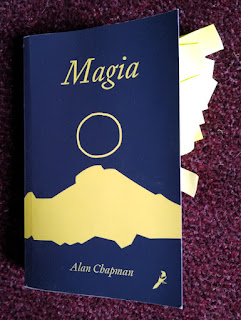Review of Albion Dreaming: A popular history of LSD in Britain, by Andy Roberts
Like most bibliophiles, I have a massive pile of books to read, some of which richly deserve reviewing. I might just be catching up...
This review seemed historically appropriate, since the 70th anniversary of the first ever LSD trip happened just the other day.
Albion Dreaming: A popular history of LSD in Britain, by Andy Roberts
http://www.amazon.co.uk/Albion-Dreaming-popular-history-Britain/dp/1905736274
I met Andy Roberts at the Breaking Convention conference in 2011, where I was delivering a talk on psychedelics in magic. He thrust this book into my hands, and I'm glad he did.
A number of worthwhile books have been written about the US experience of LSD; Roberts's goal for the book is to give a British perspective on the rise of acid. From the blurb: ''Albion Dreaming' traces the drug's complex history from its arrival in Britain during 1952 through its use in psychotherapy, the secret military experiments at Porton Down and the British hippie movement's extensive use of the powerful chemical.'
The American military uses have been well covered; Roberts recounts tales of British soldiers "hallucinating for Queen and country" in early Porton Down experiments. The psychotherapy phase of LSD is dealt with in depth, tracing the history of doctors and medical centres where the drug was prescribed. My late auntie, a wonderful woman who suffered from a disabling level of asthma all her life, was treated (unsuccessfully) with acid some time in the 50s; Roberts follows up a fair few experimental treatments for illnesses no-one would associate with psychedelic therapy these days.
The biggest base of usage was of course the 'counter-culture' of the 60s-70s. This is dealt with in a balanced way, neither attempting to hide the disasters nor downplaying the positive effects LSD had on vast numbers of people. On page 92 he writes:
'To the early LSD users the new drug signified unconditional love for other human beings and for planet Earth. It was this possibility of personal and planetary salvation that initially drove the LSD culture and which led eventually to its users becoming involved in a wide variety of transpersonal and ecological belief systems.'
That belief system of unconditional love for other people is of course one of the traps of psychedelic consciousness; no-one can sustain such a state for long, and attempts to do so sometimes broke people. The degradation of that idealism into self-destructiveness is clearly seen in some of the documents of that era. I shall eventually get round to reviewing a particularly poignant example, the novel 'Be Not Content' by William Craddock, re-released by novelist Rudy Rucker.
http://www.rudyrucker.com/blog/2012/05/13/william-craddocks-be-not-content-now-out-as-ebook/
By the early 70s I'm sharing some of the memories. The 1971 Glastonbury Fair, summed up by Mick Farren: 'We might as well have been in the sixth or even twenty-sixth century as we told tall travellers' tales of intoxication, of outwitting the law, of lights in the sky, lost continents, the lies of government collective triumphs and personal stupidity, while the music of past, present and future roared from the pyramid stage.'
Another great anecdote concerns Inspector Lee (no, not William Burroughs' alter ego, but the one of the main cops in the Operation Julie squad!), who, after the bust, went to visit psychedelic psychiatrist Ronnie Laing and campaigner Steve Abrams. 'A bizarre night of heavy drinking ensued... Lee allegedly handed in his resignation the same day.'
Roberts's attitude to LSD is one of near-incredulity at the nonsense that has been written about it:
'The idea of LSD had grown out of all proportion to the substance itself and had, for the majority of society, become a demon, a barbarian at the doors of everyday consciousness and normality. ... How the British establishment has dealt with LSD is a prima facie example of a society's inability to deal intelligently and consistently with consciousness-changing drugs.'
Coming up to (near) the present day, Roberts discusses the reports on drug harm commissioned by the government from the Medical Research Council and top experts in the field, and the flagrant disregard for fact shown by successive governments. 'If fact and experience are to be ignored over ignorance and prejudice then society will continue to reap the dubious rewards of a disenfranchised youth who know from their own experience that, if used carefully, most drugs are not particularly dangerous.'
Yes, humankind is a stoned animal, absolutely no doubt about that. Most cultures in the past have dealt with these powerful substances by socializing them. There is something particularly hysterical and brittle in our mainstream culture that seems to make that impossible. Brittle, like the world is going to break if people stop believing the dominant nonsense. Can we give this hysteria a name? How about 'conditioned fear'? You know who you are, Daily Mail feature writers.
Finally, if anyone should harbour any doubts as to Andy Roberts's depth of research, let it be known that he quotes personal emails from Owsley. Enough said.
For a much longer review, check out http://www.guardian.co.uk/books/2012/jul/25/albion-dreaming-andy-roberts-review
This review seemed historically appropriate, since the 70th anniversary of the first ever LSD trip happened just the other day.
Albion Dreaming: A popular history of LSD in Britain, by Andy Roberts
http://www.amazon.co.uk/Albion-Dreaming-popular-history-Britain/dp/1905736274
I met Andy Roberts at the Breaking Convention conference in 2011, where I was delivering a talk on psychedelics in magic. He thrust this book into my hands, and I'm glad he did.
A number of worthwhile books have been written about the US experience of LSD; Roberts's goal for the book is to give a British perspective on the rise of acid. From the blurb: ''Albion Dreaming' traces the drug's complex history from its arrival in Britain during 1952 through its use in psychotherapy, the secret military experiments at Porton Down and the British hippie movement's extensive use of the powerful chemical.'
The American military uses have been well covered; Roberts recounts tales of British soldiers "hallucinating for Queen and country" in early Porton Down experiments. The psychotherapy phase of LSD is dealt with in depth, tracing the history of doctors and medical centres where the drug was prescribed. My late auntie, a wonderful woman who suffered from a disabling level of asthma all her life, was treated (unsuccessfully) with acid some time in the 50s; Roberts follows up a fair few experimental treatments for illnesses no-one would associate with psychedelic therapy these days.
The biggest base of usage was of course the 'counter-culture' of the 60s-70s. This is dealt with in a balanced way, neither attempting to hide the disasters nor downplaying the positive effects LSD had on vast numbers of people. On page 92 he writes:
'To the early LSD users the new drug signified unconditional love for other human beings and for planet Earth. It was this possibility of personal and planetary salvation that initially drove the LSD culture and which led eventually to its users becoming involved in a wide variety of transpersonal and ecological belief systems.'
That belief system of unconditional love for other people is of course one of the traps of psychedelic consciousness; no-one can sustain such a state for long, and attempts to do so sometimes broke people. The degradation of that idealism into self-destructiveness is clearly seen in some of the documents of that era. I shall eventually get round to reviewing a particularly poignant example, the novel 'Be Not Content' by William Craddock, re-released by novelist Rudy Rucker.
http://www.rudyrucker.com/blog/2012/05/13/william-craddocks-be-not-content-now-out-as-ebook/
By the early 70s I'm sharing some of the memories. The 1971 Glastonbury Fair, summed up by Mick Farren: 'We might as well have been in the sixth or even twenty-sixth century as we told tall travellers' tales of intoxication, of outwitting the law, of lights in the sky, lost continents, the lies of government collective triumphs and personal stupidity, while the music of past, present and future roared from the pyramid stage.'
Another great anecdote concerns Inspector Lee (no, not William Burroughs' alter ego, but the one of the main cops in the Operation Julie squad!), who, after the bust, went to visit psychedelic psychiatrist Ronnie Laing and campaigner Steve Abrams. 'A bizarre night of heavy drinking ensued... Lee allegedly handed in his resignation the same day.'
Roberts's attitude to LSD is one of near-incredulity at the nonsense that has been written about it:
'The idea of LSD had grown out of all proportion to the substance itself and had, for the majority of society, become a demon, a barbarian at the doors of everyday consciousness and normality. ... How the British establishment has dealt with LSD is a prima facie example of a society's inability to deal intelligently and consistently with consciousness-changing drugs.'
Coming up to (near) the present day, Roberts discusses the reports on drug harm commissioned by the government from the Medical Research Council and top experts in the field, and the flagrant disregard for fact shown by successive governments. 'If fact and experience are to be ignored over ignorance and prejudice then society will continue to reap the dubious rewards of a disenfranchised youth who know from their own experience that, if used carefully, most drugs are not particularly dangerous.'
Yes, humankind is a stoned animal, absolutely no doubt about that. Most cultures in the past have dealt with these powerful substances by socializing them. There is something particularly hysterical and brittle in our mainstream culture that seems to make that impossible. Brittle, like the world is going to break if people stop believing the dominant nonsense. Can we give this hysteria a name? How about 'conditioned fear'? You know who you are, Daily Mail feature writers.
Finally, if anyone should harbour any doubts as to Andy Roberts's depth of research, let it be known that he quotes personal emails from Owsley. Enough said.
For a much longer review, check out http://www.guardian.co.uk/books/2012/jul/25/albion-dreaming-andy-roberts-review



Comments
Post a Comment